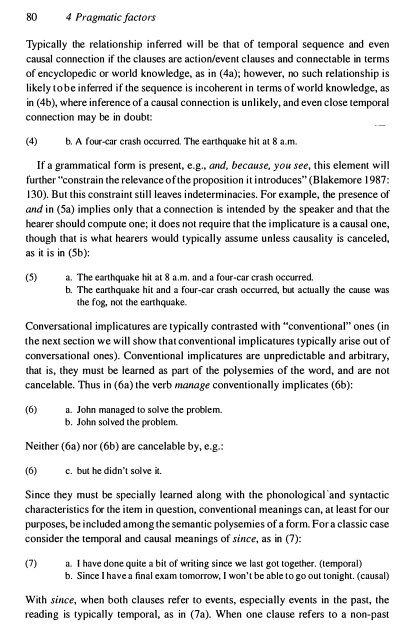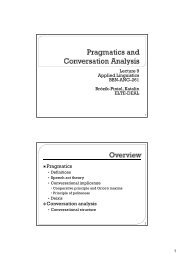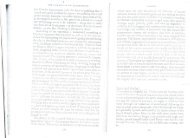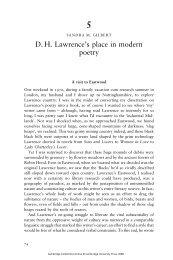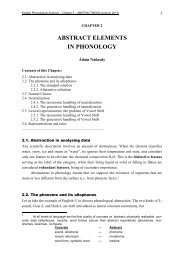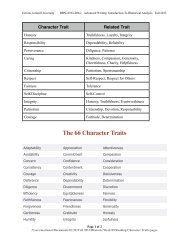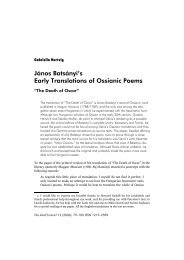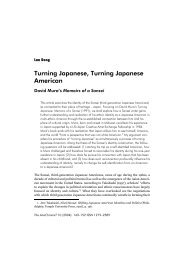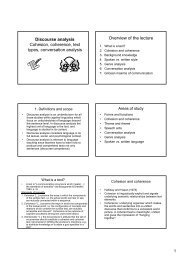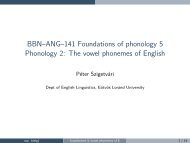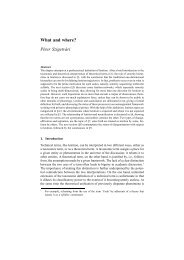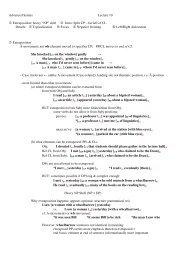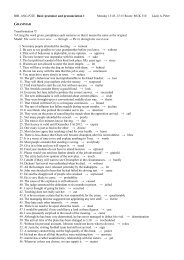Gram - SEAS
Gram - SEAS
Gram - SEAS
You also want an ePaper? Increase the reach of your titles
YUMPU automatically turns print PDFs into web optimized ePapers that Google loves.
80 4 Pragmatic fa ctors<br />
Ty pically the relationship inferred will be that of temporal sequence and even<br />
causal connection if the clauses are action/event clauses and connectable in terms<br />
of encyclopedic or world knowledge, as in (4a); however, no such relationship is<br />
likely to be inferred if the sequence is incoherent in terms of world knowledge, as<br />
in (4b), where inference of a causal connection is unlikely, and even close temporal<br />
connection may be in doubt:<br />
(4) b. A four-car crash occurred. The earthquake hit at 8 a.m.<br />
If a grammatical form is present, e.g., and, because, you see, this element will<br />
further "constrain the relevance of the proposition it introduces" (Blakemore 1987:<br />
130). But this constraint still leaves indeterminacies. For example, the presence of<br />
and in (5a) implies only that a connection is intended by the speaker and that the<br />
hearer should compute one; it does not require that the implicature is a causal one,<br />
though that is what hearers would typically assume unless causality is canceled,<br />
as it is in (5b):<br />
(5) a. The earthquake hit at 8 a.m. and a four-car crash occurred.<br />
b. The earthquake hit and a four-car crash occurred, but actually the cause was<br />
the fog, not the earthquake.<br />
Conversational implicatures are typically contrasted with "conventional" ones (in<br />
the next section we will show that conventional implicatures typically arise out of<br />
conversational ones). Conventional implicatures are unpredictable and arbitrary,<br />
that is, they must be learned as part of the polysemies of the word, and are not<br />
cancelable. Thus in (6a) the verb manage conventionally implicates (6b):<br />
(6) a. John managed to solve the problem.<br />
b. John solved the problem.<br />
Neither (6a) nor (6b) are cancelable by, e.g.:<br />
(6) c. but he didn't solve it.<br />
Since they must be specially learned along with the phonological " and syntactic<br />
characteristics for the item in question, conventional meanings can, at least for our<br />
purposes, be included among the semantic polysemies of a form. For a classic case<br />
consider the temporal and causal meanings of since, as in (7):<br />
(7) a. I have done quite a bit of writing since we last got together. (temporal)<br />
b. Since I have a final exam tomorrow, I won't be able to go out tonight. (causal)<br />
With since, when both clauses refer to events, especially events in the past, the<br />
reading is typically temporal, as in (7a). When one clause refers to a non-past


